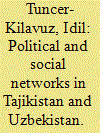| Srl | Item |
| 1 |
ID:
103137


|
|
|
|
|
| Publication |
2009.
|
| Summary/Abstract |
A major debate among scholars studying Central Asian societies concerns the structure of social and political networks in the region. Still unresolved is the issue of whether to define such networks in terms of 'clans', 'regionalism', or personal networks. This article, based on data collected during fieldwork in Tajikistan and Uzbekistan, attempts to understand these social and political networks. It suggests that networks are very complex. The networks in Tajikistan and Uzbekistan draw on various loyalties including ties of family, friendship, work, education, and patron-client relationships. They are neither purely regional nor purely clan-based. Personal networks, factions, and self-interest play important roles. At the elite level, networks more closely resemble patron-client networks, which may or may not include regional or kinship ties. Among ordinary people, such ties tend to be based on localism, kinship, and/or patronage relationships.
|
|
|
|
|
|
|
|
|
|
|
|
|
|
|
|
| 2 |
ID:
103210


|
|
|
|
|
| Publication |
2011.
|
| Summary/Abstract |
In order to explain why civil war erupted in Tajikistan but not in Uzbekistan this article assesses a range of theories that have sought to explain the occurrence of civil wars. After assessing the strengths and weaknesses of a number of these different existing approaches in the comparative literature, it argues that the eruption of civil war in Tajikistan and its absence in Uzbekistan can be explained by adapting ideas from bargaining theories of war that have been developed in the literature on international relations. It argues that it is important to study the adversaries' perceptions of power in relation to the actions that led to the civil war and how the perceptions of the distribution of power are influenced by structural, process and network-related variables. Consistent with bargaining theories of war, a disparity between the distribution of power and distribution of benefits seems an important factor in the eruption of civil war in Tajikistan.
|
|
|
|
|
|
|
|
|
|
|
|
|
|
|
|